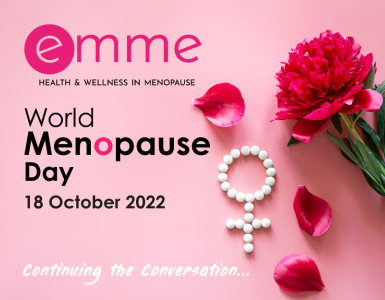Going through the menopause means that you can experience many changes both physically and mentally
You might for example notice changes in your body shape or your ability to recall certain things, both of which are entirely normal symptoms of the menopause.
Other common and perfectly normal symptoms of the menopause include a lack of libido and vaginal dryness, making enjoying an active sex life more difficult
A lack of libido is caused by a complex mix of physical and emotional problems. The menopause is caused by a natural lowering of the female hormone, oestrogen. It’s this drop in oestrogen that causes some of the physical symptoms of the menopause including vaginal dryness.
When we enjoy something like sex, we naturally want to have more of it. But if that thing we enjoy becomes painful or uncomfortable as sex can do if we’re suffering vaginal dryness, then naturally, we’ll be put off wanting to have sex. At the same time, physical changes in our shape and our body confidence may mean that we don’t feel like getting undressed or turning it on in the bedroom.
Many females need to feel emotionally connected to both themselves and their partners in order to have sex, and if we don’t, this too can have an impact on our sex drive. Feeling less confident than we used to, and not having an understanding partner who appreciates what it is to go through the menopause doesn’t help either.
These things combined add up to a situation where we may feel the desire for sex, but we’re simply not aroused because we’re fearful of what it will feel like (will it feel painful for example) and what we think we look like. And therefore, we experience a lowered libido and as a vicious cycle, we may feel less desirable and sexy as a consequence.
But the good news is, there are things we can do
Foreplay should always play an important role in sex, especially for women, and it’s perhaps more important for women going through the menopause (and post-menopausal women). Removing the pressure to have sex and simply enjoying foreplay can also make you feel more relaxed and open to learning what works best for your arousal. Using a lubricant will also help to combat vaginal dryness making intercourse easier and more enjoyable.
Psychosexual and relationship therapy can help if that’s a route you’d like to explore
This means talking to a psychosexual relationship counsellor about your sexual difficulties. It can be on your own (even if you have a partner) or as a couple. Talking through your concerns with a therapist might seem daunting or embarrassing, but if sex is an important part of your life, then it can help to get things out in the open. Once you begin to open up (and realise that your therapist is there to help you, not pass judgement) it could be just the thing you need to empower you to explore what works for you sexually.
Therapy of this sort can be especially helpful if your partner is left feeling confused by your lack of sex drive
Talking openly in a safe space will help him or her understand what you’re going through and help comfort them that you haven’t ‘gone off’ them, but that you’re struggling with your libido. Intimate connections can really suffer if one partner is struggling, and can become a much bigger problem. But communicating your feelings will help to reform that bond of closeness, intimacy, love, passion and ultimately, sex.
Sex is supposed to be an enjoyable experience, something which is often overlooked when it’s clouded by fear, pressure and the unknown
Taking back control of what sparks your desire and arousal is entirely possible, meaning that there is a sex life after the menopause.















